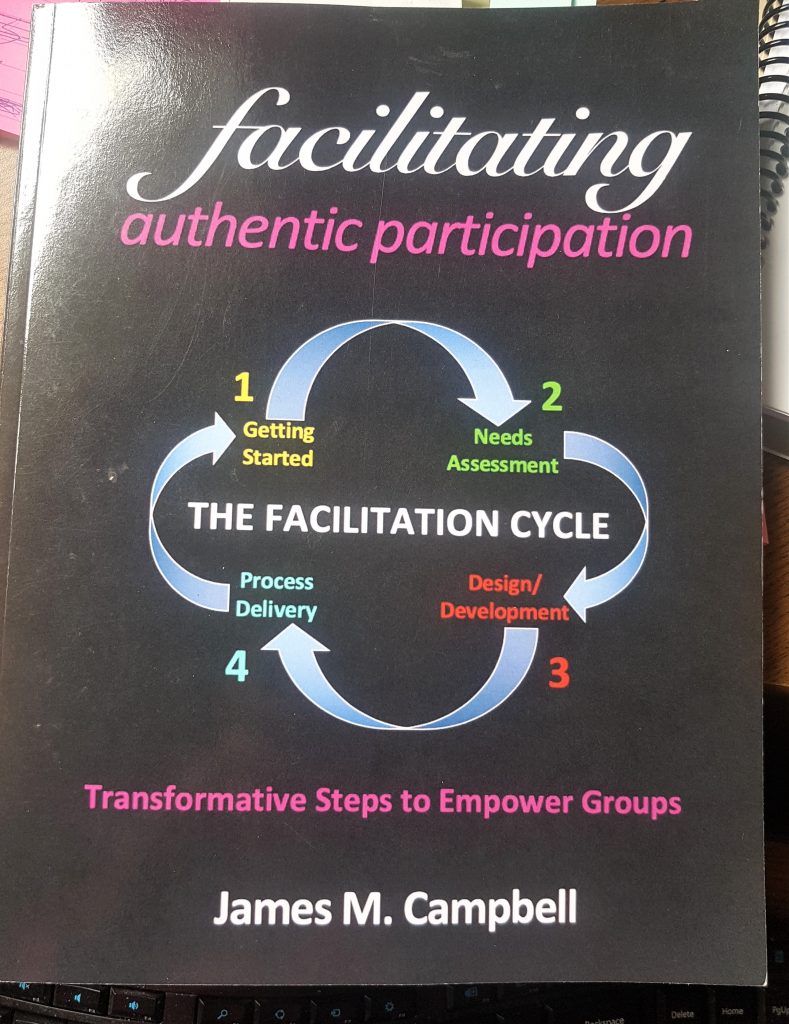What a joy to read this book titled “facilitating authentic participation” by James M. Campbell. The author describes and summarizes much of what I have learned from 25 years of facilitating individuals in groups as they converse, discuss and decide. I have not met James, yet, share common facilitation approaches such as the Technology of Participation (ToPTM) and am involved with the same organizations such as the Institute of Cultural Affairs http://www.ica-international.org/ and International Association of Fac ilitators. Reading this book deepens my understanding of ToP philosophies and methods and strengthens my commitment to the local and global facilitation field.
ilitators. Reading this book deepens my understanding of ToP philosophies and methods and strengthens my commitment to the local and global facilitation field.
Here are some of my favourite excerpts from the book which author James M. Campbell has graciously given me permission to share. The book, as described in this link, https://www.amazon.com/Facilitating-Authentic-Participation-Transformative-Empower/dp/1541220854 “takes you behind the scenes of the usually hidden planning and diagnostic process leading up to the “magic” of guiding a group process that allows the group’s deepest wisdom to be shared in a feasible action plan that everyone is motivated to accomplish. What may look simple, effortless, and easy to accomplish is the culmination of an intensive series of consultative stages of preparation requiring the listening, analytical, and collaborative skills of a master facilitator.”
The facilitation cycle in the book, while simply worded in a four-stage process, conveys a comprehensive way to design and deliver facilitated sessions. The four stages are then described in seven phases.
| Stage 1: Getting Started | Phase 1: Initial Contact
Phase 2: Contracting |
| Stage 2: Needs Assessment
|
Phase 3: Collect Data
Phase 4: In-depth Analysis |
| Stage 3: Design/Development | Phase 5: Facilitation Plan |
| Stage 4: Process and Delivery
|
Phase 6: Facilitate the Event
Phase 7: Closing |
The book outlines four characteristics of authentic participation (page 20):
- The participants have a sense of belonging.
- Every member of the group has a significant role.
- Any participant can play a leadership role.
- The participants are confident that the group will accomplish its goals.
The four essential values that foster authentic participation in a group are (page 21):
- Trust
- Openness
- Security (safety)
- Commitment to participation
The facilitator’s responsibility is to “enable a group to operate with these four values through process, group norms, space and time and techniques.” (page 22)
A facilitator juggles three jobs/responsibilities: (page 36)
- facilitating the process,
- enabling the group,
- eliciting the content.
From these introductory concepts, Campbell then delves into each stage and phase in detail starting with the initial contact with a client to the assessment, disengagement or continuation after the facilitated event takes place.
Statements in the book that I love:
- A sign of a great facilitator: when the facilitator and the process become transparent and the group knows itself as capable and able to meet the challenges before them. (page 130)
- The group did the hard work and I was just an enabler. (page 131)
- A facilitator only has one objective; the objective of the group he is working with.
- Facilitation depends upon the facilitator’s caring and empathy for the people he is working with. I believe that the most important factor in a facilitator’s capacity to effectively lead a group to fulfilling its objective is his confidence that the members are capable of doing the work and their confidence that the facilitator will lead them to accomplishing their objective.” (page 131)
The book is an excellent resource for all facilitators, whether new to the field or highly experienced. I particularly value Campbell’s ability to concisely explain complex philosophies, approaches, and techniques of facilitation. This blog describes book 3 of the six books I said I would read and write about this summer. To read my blogs about book 1, “Embers” by Richard Wagamese and book 2 “Wellness Incorporated” by Jennifer Buchanan, visit these links.
http://www.barbpedersen.ca/silence-gift-facilitation-conversation-excerpt-1-summer-reading-list/
